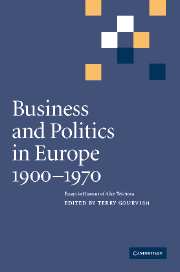Book contents
- Frontmatter
- Contents
- List of figures
- List of tables
- List of contributors
- Preface
- 1 Introduction: the business–government relationship
- Part I The business–politics paradigm
- 2 Business and government in twentieth-century Sweden: a tale of income redistribution and rent-seeking?
- 3 An economic background to Berchtesgaden: business and economic policy in Austria in the 1930s
- 4 Business, politics and revolution in early twentieth-century Ireland
- Part II Banking finance
- Part III Business and politics in the National Socialist period
- Part IV The business community and the state
- Appendix: Alice Teichova: a select bibliography
- Index
4 - Business, politics and revolution in early twentieth-century Ireland
Published online by Cambridge University Press: 12 March 2010
- Frontmatter
- Contents
- List of figures
- List of tables
- List of contributors
- Preface
- 1 Introduction: the business–government relationship
- Part I The business–politics paradigm
- 2 Business and government in twentieth-century Sweden: a tale of income redistribution and rent-seeking?
- 3 An economic background to Berchtesgaden: business and economic policy in Austria in the 1930s
- 4 Business, politics and revolution in early twentieth-century Ireland
- Part II Banking finance
- Part III Business and politics in the National Socialist period
- Part IV The business community and the state
- Appendix: Alice Teichova: a select bibliography
- Index
Summary
Exploration of the relationships between business and politics in early twentieth-century Ireland offers the opportunity to examine how businessmen responded to widespread violence and partition of the country in 1920. The emergence of modern paramilitary groups, most notably the Ulster Volunteer Force (UVF) in 1913 and the Irish Republican Army (IRA) from about 1918, had important implications for business activity. Business enterprise operated in an environment sometimes characterised by the rule of law, sometimes by lawlessness. An increasingly common feature of this period, especially in the north-east, was workplace violence, the repercussions of which were national in scope and which thus affected business in all parts of Ireland. Moreover, some of the themes so often discussed by historians of continental Europe after the First World War find an echo in Ireland: the significance of borders and borderlands; the economic viability of new political units; plebiscites; business boycotts; the treatment of minorities; the establishment of new parliamentary institutions and their relationship to more violent methods. The interaction of business, politics and governments has been a major research area for Alice Teichova for decades. One of her most recent books examines the relationships between economic change and nationalism in twentieth-century Europe and the present chapter might be seen as a contribution to that subject.
The problem of north-east Ulster
The nature of economic relations between Britain and Ireland, and within Ireland itself, was a major influence on both unionism and nationalism.
- Type
- Chapter
- Information
- Business and Politics in Europe, 1900–1970Essays in Honour of Alice Teichova, pp. 63 - 86Publisher: Cambridge University PressPrint publication year: 2003



